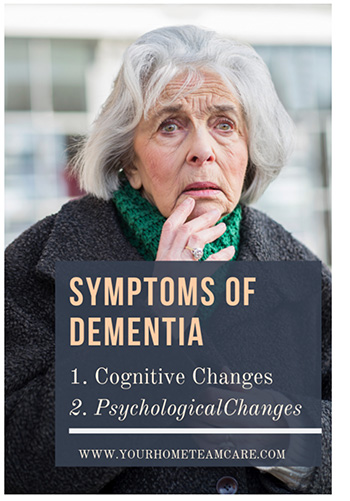When people hear the word dementia, they almost instantly think of Alzheimer’s. However, there are several different types of dementia. Knowing the difference means knowing what to expect, and getting the right treatment when available. Here are the most common types of dementia apart from Alzheimer’s.
Vascular Dementia
Vascular dementia accounts for about 10 percent of dementia cases and is the result of problems with the blood vessels which supply the brain. It often develops after the person has had a stroke. A person with vascular dementia will not have the degree of memory loss of a person with Alzheimer’s, but they will have trouble thinking, planning and organizing.
The course of the illness is unpredictable, because the location, number and size of the brain injuries from one or more strokes will determine whether dementia will result, and how the individual’s thinking and physical function will be affected.
Mixed Dementia
A person can have brain changes resulting from more than one cause, such as vascular dementia and Parkinson’s. In this case, they are said to have mixed dementia. This is most likely in people over 85.
Dementia with Lewy bodies (DLB)
Lewy bodies are clumps of a particular protein that can clog the cerebral cortex and affect memory and thinking problems. People with this condition often have trouble sleeping and visual hallucinations. They sometimes exhibit similar symptoms to those with Parkinson’s disease. The symptoms/course of the disease will vary depending on the movement of the Lewy bodies. This can result in many normal moments and then sudden declines into dementia.
Parkinson’s Disease
As Parkinson’s disease progresses, it often results in dementia similar to dementia with Lewy bodies, or Alzheimer’s. The main symptoms are problems with movement, such as slowness, rigidity, tremor and changes in gait and tremor (the shakes). With Parkinson’s, Lewy bodies form in an area deep in the brain called the substantia nigra. They cause degeneration of the nerve cells that produce dopamine, an essential neurotransmitter or chemical which controls movement.
The boxer Muhammad Ali developed Parkinson’s after his sports career and lived with it for many years. The actor Michael J. Fox was diagnosed with it at a very young age, but lifestyle strategies and medication help him keep working.
Frontotemporal Lobal Degeneration (FTLD)
This dementia affects the frontotemporal area of the brain and results in changes in personality and behavior, as well as difficulty with language. Nerve cells that are in the front & side regions of the brain are particularly affected. It tends to affect people at a younger age: 60% of people with FTLD are aged 45 to 60. It accounts for about 10 percent of all dementia cases.
Creutzfeldt-Jakob Disease
Now CJD is the most common human form of a group of rare, fatal brain disorders that affect not only people, but certain other mammals as well. It is often referred to as “mad cow disease” and is thought to result from eating animal products from infected cows. It is a fatal disease that impairs memory and coordination and causes behavior changes as the proteins in the brain all start to malfunction.
Huntington’s Disease
Simply put, Huntington’s disease is a progressive brain disorder that is caused by a single defective gene on chromosome 4. Symptoms include tremor and jerking, a severe decline in thinking and reasoning skills, and irritability, depression, and other mood changes. The symptoms will get worse over time as more of the proteins in the brain are affected.
Wernicke-Korsakoff Syndrome
This syndrome is a chronic memory disorder caused by a severe deficiency of thiamine (vitamin B1), usually the result of chronic alcoholism. Symptoms include a very bad memory, though otherwise, the person’s thinking will seem normal. Getting more B1 and cutting back on alcohol should restore the natural balance in the brain.
As you can see, there are many different types of dementia and a medical professional will be able to diagnose which type a person suffers from.
 Symptoms of Dementia
Symptoms of Dementia
It is important to remember that there are many different forms of dementia. Not all dementia is Alzheimer’s. However, the various types often have some signs and symptoms in common.
Common Symptoms of Dementia
There are two types of symptoms, cognitive (related to thinking) and psychological changes.
- Cognitive changes
- Memory loss, which is usually noticed by a spouse, relative, or someone other than the person suffering from cognitive impairment
- Difficulty handling complex tasks
- Trouble with everyday tasks the person would normally do easily, such as at work
- Trouble with planning and organizing
- Difficulty communicating or finding words
- Difficulty reasoning or problem solving
- Difficulty with coordination and motor functions
- Confusion and disorientation
- Psychological changes
- Personality changes, such as a normally quiet person becoming loud and aggressive, or vice versa
- Sadness, depression
- Anxiety, worrying about things for no specific reason
- Inappropriate behavior, such as being rude or lacking in good manners
- Paranoia, being convinced that people are spying on them or out to get them
- Agitation, nervousness, even in familiar situations
- Hallucinations, seeing things and people that aren’t there (around 50% of Parkinson’s patients have this)
Causes of Memory Loss
It is important to note that not all of these symptoms demonstrate a clear diagnosis of dementia. For example, some medications can cause memory loss and/or behavioral changes. So can stress, and a lack of sleep/sleep deprivation.
Discussing the issue with your doctor could mean a switch to a similar medication but without the same side effect. Stress management techniques and focusing on a person’s sleep routine could lead to improvement.
Progression of the Condition
If you notice your own memory failing, or see a loved one exhibiting more and more symptoms, it is likely to be dementia – in which case, you would need to see a doctor for a definitive diagnosis.
Warning Signs of Alzheimer’s
As the population in the West ages, many people are concerned about developing Alzheimer’s. They can often become disturbed by changes in their memory and fear the worst. But not all dementia is Alzheimer’s.
Here are some warning signs to watch out for in yourself or a loved one:
- The memory loss is so severe, it disrupts daily activities
In this case, the person is unable to remember simple things or do their regular daily activities easily. They start to become more dependent and unable to handle things on their own.
- The person has trouble with planning and simple tasks
Many older people find themselves having trouble managing their finances and paying bills, following recipes, and taking much longer than usual to complete simple tasks.
- Becoming challenged by technology
The person finds it hard to use tools they usually have no problems with, such as a computer or microwave.
- Confusion with the time or where they are
They lose track of hours and days and are often confused about where they are and how they got there.
- Vision problems
There are a number of tests a doctor can administer which will reveal typical vision distortion and other issues suffered by those with Alzheimer’s.
- Trouble speaking or writing
A person with Alzheimer’s will start to lose their words and will also have trouble following conversations.
- Social isolation
As a result of psychological changes and trouble communicating, those with Alzheimer’s often withdraw from family and friends, which can actually worsen their condition.
- Losing things
The person will often lose things like keys and money.
- Decreased or poor judgment
People with Alzheimer’s may also experience changes in judgment or decision making. For example, they may use poor judgment when dealing with money, such as giving large amounts to telemarketers. They will most likely pay less attention to their personal grooming or keeping themselves clean.
- Changes in mood
The most common change is depression, but it might also be anxiety or aggression. These signs and symptoms can help identify Alzheimer’s and other dementia so that the best possible help can be sought. Our Team is trained to care for seniors with dementia so that they can still live their life independently in the comfort of their own home. Give us a call today and speak to one of our staff about the in-home services we offer (865) 332-5000 or visit our Services Page.

